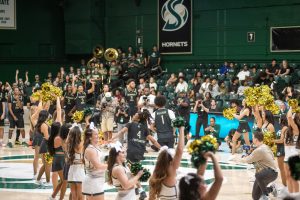Blind CSUS student helps chemistry camp
November 20, 2013
As someone who keeps busy with everything from barbecuing to serving as a mentor at California Chemistry Camp, a camp for blind and visually-impaired teenagers, 31-year-old Sacramento State psychology major Angela Fowler could seem to disregard the fact she is blind. Really, she is just living her life with the potential she believes everyone holds.
Fowler started contributing her efforts to California Chemistry Camp as soon as her good friend Henry “Hoby” Wedler – California Chemistry Camp founder and UC Davis Ph.D candidate in organic chemistry – pitched the idea in 2010.
Soon thereafter, the camp successfully landed on its feet at Enchanted Hills Camp in Napa Valley, Calif. and is now heading into its fourth year of experiments, explosions, nitrogen ice cream and guest speakers from NASA.
“To me it’s like a second Christmas,” Fowler said, who has served as a camp mentor for the last three years and logistics coordinator the last two years.
As logistics coordinator, Fowler’s duties include sending out permission slips, acceptance letters, and conducting transportation arrangements for attending teens.
“Angela is one of the most organized and dedicated people I know; I can’t say enough how valuable that is,” said Wedler.
As a mentor, Fowler acts as a friend – as well as a role model – to a small group of teens and enjoys watching their development throughout the camp weekend.
“For many of these kids, it’s the first time [for them] to just be a blind person – doing what blind people do in the way blind people do them – and not being judged if they get something wrong,” Fowler said
At California Chemistry Camp teens get to experience chemistry in a way most of us never have – solely with sound – and it’s inclusive of everything from launching bottle rockets, analyzing meteorites, determining acids and bases, and informative lectures on careers in the chemistry field.
“I would like it [California Chemistry Camp] to become a way to educate students and adults in science [so] that they can use science as a lens and know, with enough work, anything is possible,” said Wedler.
Aside from learning chemistry, Fowler said the camp is also a place where teens get to manipulate food in various ways, including spreading butter on toast and pouring juice from a pitcher; some things many of them never try before arriving at camp.
The philosophy behind this camp is to stress the importance of taking risks and trying new things despite being blind or visually-impaired; a truth very close to Fowler’s heart.
“I see so many blind people just sitting at home and not doing anything – not going out there and interacting with the world – and it just breaks my heart,” Fowler said.
That being said, this camp has contributed to helping others change their outlooks on life, including Fowler’s, and has encouraged a stronger sense of individual potential among teens as a result of learning a subject – chemistry – which doesn’t come easy to many people.
“If we can do chemistry and mix hydrochloric acid – and do those things we’ve been told all our lives we can’t do – we can do whatever we want,” Fowler said.
Fowler said the camp has influenced many teens to move on to bigger and better things, sometimes chemistry-related and other times not. She reflected back on 2012 and a young man she mentored who felt discouraged due to his lack of sight.
After attending camp, Fowler said the young man felt inspired to attend a leadership seminar with the National Association of Blind Students and he now serves as a board member for his local chapter in the association’s student division.
“He has really taken off,” Fowler said.
Fowler’s efforts to inspire other blind individuals does not stop at sharing her excitement as a mentor and coordinator at California Chemistry Camp.
When not preparing for the next year’s camp, Fowler has contributed her efforts to the California Association of Blind Students [CABS], where she served as President for four years, and she currently works as a Trainer of Adaptive Technology at the High Tech Center in the AIRC on campus, teaching other blind students how to use iPhones, iPads and computers auditorily. She also informs students about alternative media available, such as programs that transform tests and textbooks to braille and audio.
“Not being able to see isn’t in it of itself a handicap; a nuisance, yes, but not a handicap. We are handicapped by societal ignorance – about our capabilities and the ways that we do things,” Fowler said.
Janice Daniels can be reached at [email protected]






















































































































